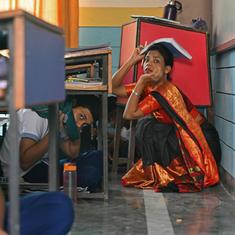The Big Story: Caste question
A year after Rohith Vemula’s death, his mother has been given 15 days to prove she is Dalit or else face action. The PhD scholar, who committed suicide at the University of Hyderabad last January, had left behind an eloquent note on the experience of discrimination and being trapped in his identity in a casteist society. It triggered protests in campuses across the country, with mounting allegations that the Akhil Bharatiya Vidyarthi Parishad and ministers from the Bharatiya Janata Party, which reportedly called the shots in the campus administration, had hounded him to his death. Now the case seems to rest on the question of whether he was Dalit at all. As with the Dadri lynching of September 2015, when 52-year-old Mohammad Akhlaq was battered to death for allegedly eating beef, the case has gone through a magical inversion. The victims must defend themselves rather than the accused.
As university vice chancellor Appa Rao and Union Minister Bandaru Dattatreya faced charges under the SC/ST Atrocities (Prevention) Act for abetting the suicide, Central and state authorities concentrated on disproving Vemula’s Dalit status. Last year, a judicial commission appointed by the Centre submitted its report, claiming that Vemula was not a Dalit: his mother may have been of the Mala caste (a scheduled caste in Andhra Pradesh), but his father had belonged to the Other Backward Classes. Questions had been raised about the report, with the chairman of the National Commission for Scheduled Castes claiming that concerns raised by the Congress had been set aside by the one-member inquiry panel. It also seemed to go against legal opinion, which held that the child could take on the caste identity of either parent. Now, state authorities have diverted their efforts to proving that Vemula’s mother is not a Dalit either.
Legalities aside, the government displays a wilful ignorance of how identities are shaped and calcified in a rigidly casteist society, of how discrimination works. Vemula’s brother has gone on record to say that they “lived like Dalits”, raised in a Dalit community and subjected to all the humiliations faced by it. It is an experience that seems to have been reinforced even in the probe that followed Vemula’s death. His mother has spoken of being subjected to humiliating interrogation by Guntur district officials, who raised questions about how she supported her family in spite of being separated from her husband.
But no matter. In the eyes of the state, the guilt of Rao, Dattatreya and bullies in the ABVP rests on whether Vemula was a Dalit at all. Just as the guilt of the murderous crowd in Dadri rests on whether the meat in Akhlaq’s fridge that the authorities seized for laboratory testing was beef and not mutton as his family said it was. In its conduct in both the cases, the government threatens to prove its most jaundiced critics right. That it is anti-Dalit and anti-minorities, that it lacks the vital fibre of empathy for the marginalised.
The Big Scroll
Mayank jain sent despatches from Hyderabad, reporting on the protests that broke out in the months after Vemula’s death.
Dilip D’Souza listened in on conversations at the distressed campus.
Anjali Mody points out the similarities in the Centre’s responses to Vemula’s suicide and the lynching at Dadri.
Anup Surendranath on why the attempt to deny Vemula Dalit status displays ignorance of the law, or deliberate misrepresentation.
Mosarrap H Khan on the regenerative potential in the anguish created by Mohammad Akhlaq and Vemula’s death.
Political pickings
- The BBC faces government blacklist for “grossly erroneous” film on the killing of Kaziranga poachers.
- In Tamil Nadu, O Panneerselvam, ejected from the All India Anna Dravida Munnetra Kazhagam and thwarted in his bid to become chief minister, seeks a floor test in the assembly and tries to build alliances with the late Chief Minister J Jayalalithaa’s niece, Deepa Jayakumar.
- In Manipur, human rights icon Irom Sharmila, fighting elections for the first time, says she was offered money by the BJP to fight Congress Chief Minister Okram Ibobi Singh.
- Voting begins in Uttarkhand, while Uttar Pradesh goes into the second phase of polls.
Punditry
- In the Indian Express, Ashutosh Varshney argues that a Trump presidency pits ideals of freedom and equality against America’s pre-1965 history.
- In the Hindu, Srirm Panchu on the Sasikala conviction, which took two decades in coming.
- In the Economic Times, ON Ravi on why stringent data protection has become imperative after demonetisation and the government’s digitisation drive.
Giggles
I just heard that NORSE MYTHOLOGY has gone in at the top of the Sunday Times Bestseller list. Having Odin as PR assistant obviously works. pic.twitter.com/vboL7iL6Ts
— Neil Gaiman (@neilhimself) February 14, 2017
Don’t miss...
Abhishek Dey on how the shadow of demonetisation hangss over poll-bound Haridwar:
“Having performed his prayers at the mosque in Padartha village in Uttarakhand shortly after the break of dawn on Monday, Taufiq Ahmad stood outside a roadside tea stall, looking for a ride to Haridwar town, around 18 km away. A semi-skilled labourer who mostly works at construction sites in and around the pilgrim town, the 60-year-old said the first two months after the government’s demonetisation decision on November 8 had left him with no work, no wages and no way to feed his family. Now, he works around 10 days a month in sugarcane fields in the area, earning between Rs 150 and Rs 200 a day – half of what he used to make earlier.
The hardships he faced have made him certain that the cash crunch will have a bearing on Assembly elections in the state on Wednesday. When asked who he thinks will win from Haridwar Rural constituency, one of two seats from where incumbent Chief Minister Harish Rawat is contesting, Ahmad said, the Bharatiya Janata Party ‘will have to bear the repercussions of notebandi’.










